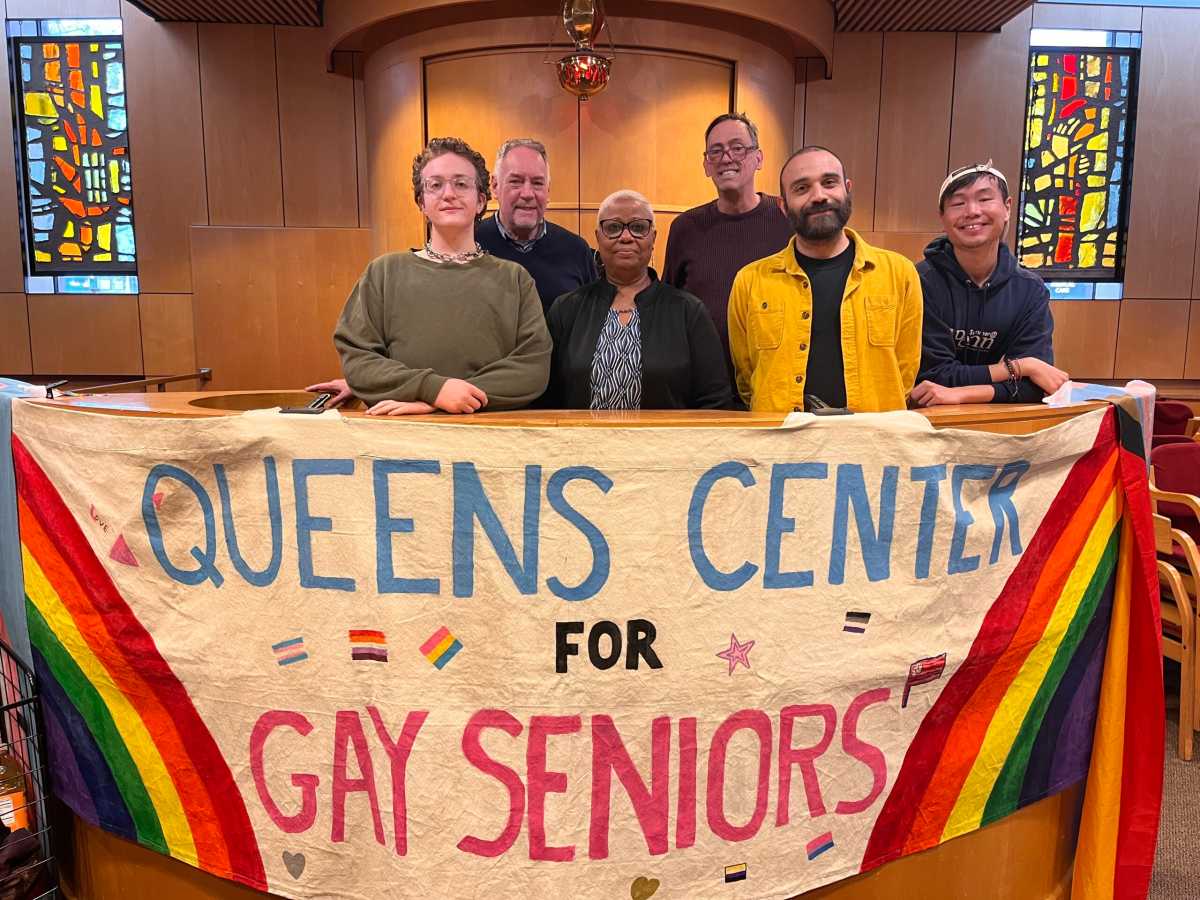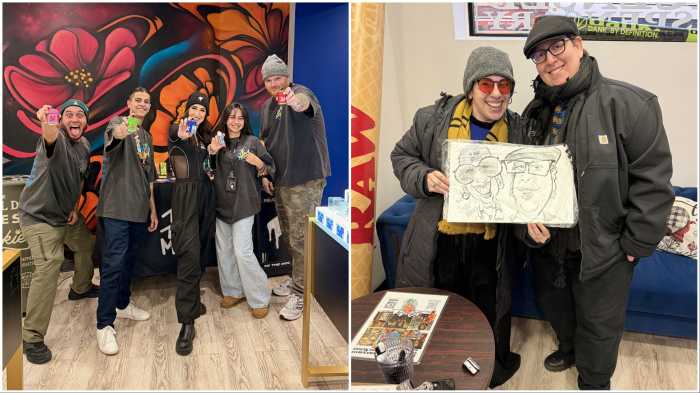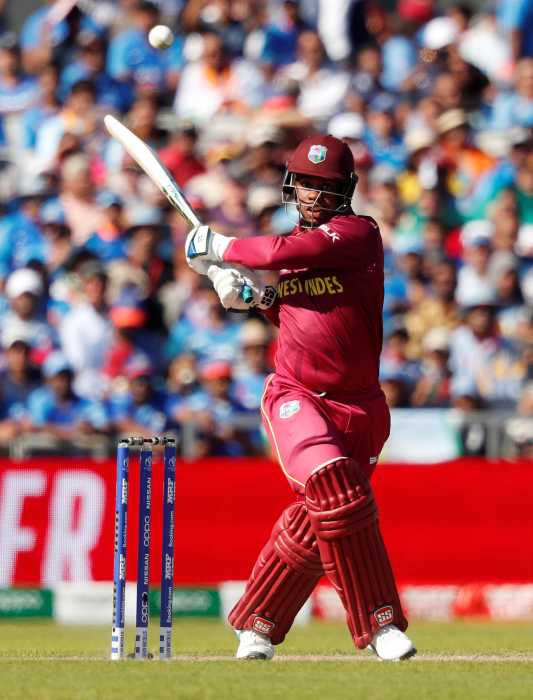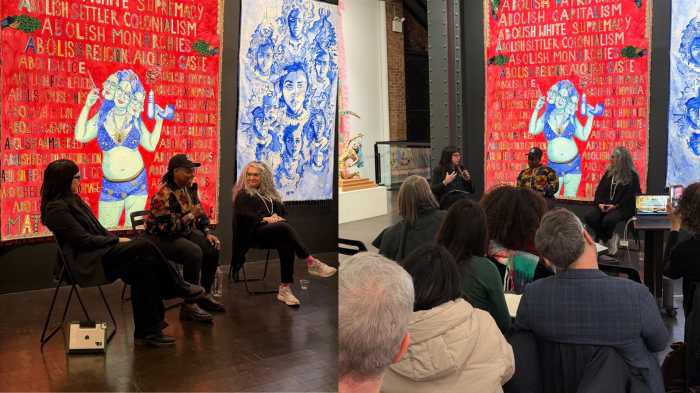A warm, inviting atmosphere engulfed the room on Dec. 20 at the Queens Center for Gay Seniors in Jackson Heights, where dozens of older adults from around the borough joined together for an enriching afternoon of activities, games, discussions, and goodies to take home. They were eagerly awaiting their much-anticipated annual holiday party that same week.
At the entrance of the center sat a table adorned with informational pamphlets and other resources — most of which featured rainbow colors and inclusive messaging catered to the LGBTQ community. A large banner painted in the colors of the Rainbow Flag and Trans Flag was perched prominently on display on the other side of the room at the center, which is located at the Jewish Center for Jackson Heights at 37-06 77th St.
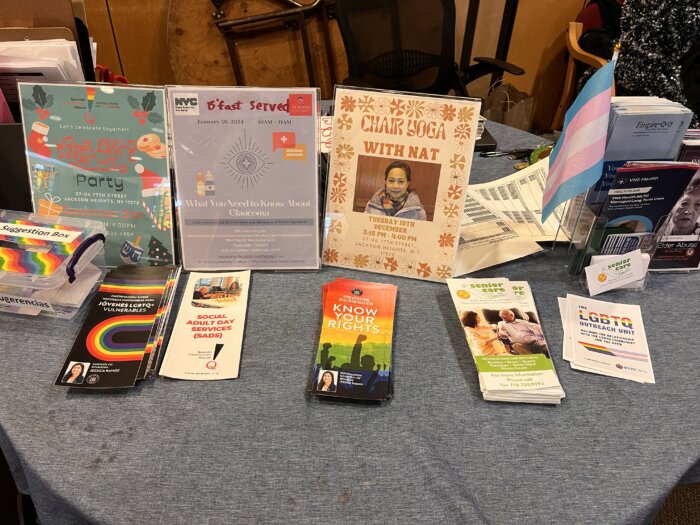
While many senior centers take a generic approach, the Queens Center for Gay Seniors — which is a program of Queens Community House — draws members in large part because it is specifically tailored to serve LGBTQ older adults. Members stay deeply engaged thanks to a fulfilling daily itinerary that includes offerings such as art and anti-fraud classes, computer lessons, demographic-based groups such as a trans-specific one, workout sessions, games, and an intimate group discussion touching on the schedule, important topics of the day, or activities at the center. There are also affordable meal options for members as well as friendly visiting services. They even have programming about the LGBTQ history of Queens.
“We’ve existed since the ‘90s, but recently got funded through the City of New York as an innovative senior center,” said Bert Shankle-Reyes, who is the director of Queens Center for Gay Seniors. Shankle-Reyes said in recent years the city set out to provide an LGBTQ-oriented senior center in every borough, and although SAGE — a large provider of services for LGBTQ older adults — has taken the lead on centers in four boroughs, the Queens Center for Gay Seniors was tasked with covering Queens, giving it a unique role in the city’s quest to serve queer older adults.
While many of the members identify as part of the LGBTQ community, Shankle-Reyes said the center also draws local people who are allies and just want to be part of a local senior center. The members include Spanish speakers, so the on-site case worker is bilingual, Shankle-Reyes explained, though they have tools to help translate from other languages too. On a given day, the center will often see 70 or more members, and sometimes — like in the case of the holiday party — they tend to get more than 100 people to show up.
“One of the great parts about this generation being the generation that got us our rights is they know how to be welcoming and they know what it’s like to be discriminated against, so they keep that in mind and treat everybody as an equal,” Shankle-Reyes added. “So why wouldn’t we do that for someone else?”
The center takes on daunting tasks to serve the needs of a growing population of older adults. Thomas Weber, who serves as the multisite director of older adult center-based services at Queens Community House, said some of the biggest needs facing members include affordable housing, cost of living, and safety.
“To older adults, if they get priced out where they are, chances are they have to move somewhere far away from anywhere they’ve been living for decades,” Weber said. For those who live in walk-up apartments, he said, members are even further impacted by mobility issues.
“The cost of the city is high and many of [the members] are on a limited income,” Weber said. “They have to struggle more and more to make ends meet when things get more expensive.”
The Queens Center for Gay Seniors seeks to alleviate some of those compounding stressors through different services. On the afternoon of Dec. 20, for example, the center piled up giveaway bags featuring canned and boxed foods and beverages for members.
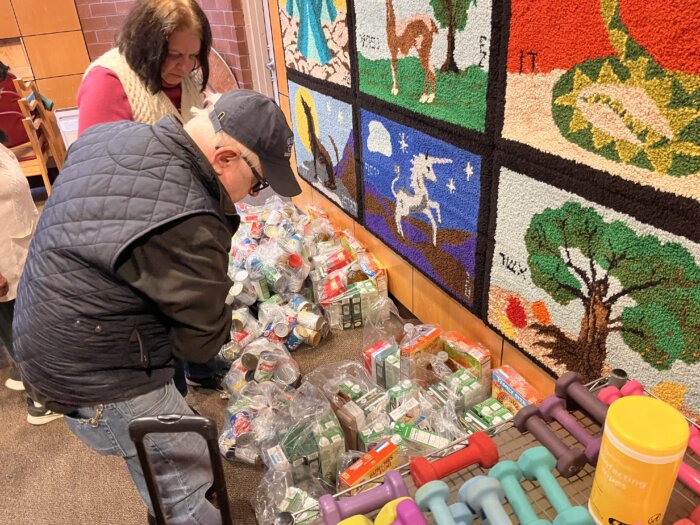
That same afternoon, members sat down at their respective tables for a pleasant game of bingo before everyone huddled in a circle for a group discussion during which individuals elaborated on the importance of the center.
One member spoke about how comfortable it was to wear nail polish in an environment where people tend to be accepting without judgment. Another member echoed those sentiments, saying they could be themselves without the unnecessary commentary they might hear at other centers. And in a feel-good example of the group camaraderie on display throughout the day, one member who had recently been absent and recovered from a fall received a round of applause from members who had been concerned about what happened.
Following the meeting, several members spoke up about their own backgrounds and why they chose to attend that center in particular. Rich Wandel, a former president of the Gay Activists Alliance and founder of the archives at the LGBT Center in Manhattan, said he started coming to the center about eight years ago.
“I had to get used to the idea of being a senior first,” Wandel said. “Somebody told me about it, I met some good people, did some interesting programs, and we do a history group here.”
Wandel was driven to the center in the first place because of its inclusive nature.
“I think almost any LGBTQ person would agree that there is nothing as comfortable as being in an LGBTQ space, even compared to being in a group where you know where they’re all accepting,” he said. “It’s still not quite the same as being in an LGBTQ space.”
Others on hand that day included Eleanor Batchelder, 83, who attends the center with her wife. Batchelder said she recently won a writing competition at the center.
“I was so thrilled about it,” she said. “You’re getting old — you’re not sure what powers you still have. I used to be a very good writer, but I hadn’t written anything in awhile, so I wasn’t quite sure.”
Batchelder described the center as a “place with a lot of opportunities” to meet other people, to learn more, and to participate in activities.
Batchelder grew up in New York but eventually lived in various parts of the world, from Toronto to Tokyo, and most recently landed in Jackson Heights. She and her wife heard about the Queens Center for Gay Seniors from other gay residents of Jackson Heights.
“I’m getting older and, in some ways, better,” she said.
Sitting at the same table was a married gay couple, Richard Mirro and Carl Eden, who said they like to attend the center because they are able to meet friends, participate in exercise classes, and go on field trips.
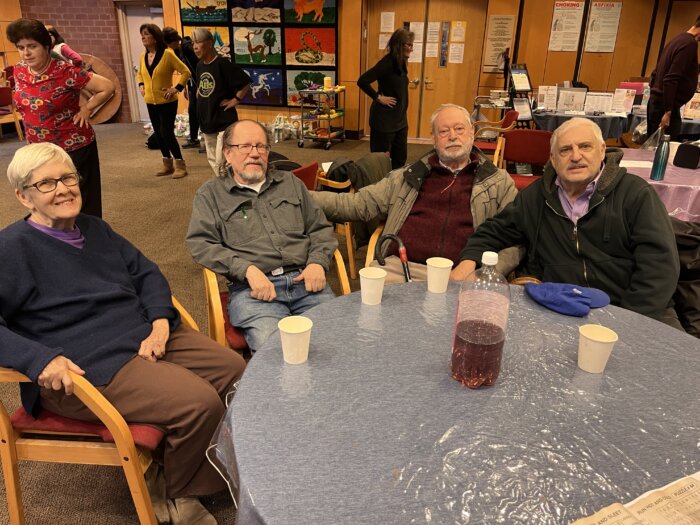
“We’ve gone to Broadway shows together; we’ve gone to Fire Island together,” Mirro said. “During the day, when we’re not on field trips, there is an exercise course in the morning and in the afternoon. So if you sleep late, you can exercise in the afternoon.”
When asked why he attends this center, Eden said he comes “because I heard about it.”
“What I like about coming here is I can be myself — or I can be somebody else,” he said. “It’s comfortable, it’s accepting, it’s LGBT, and there’s freedom. There’s relaxation. There’s always something happening that will bend your mind, so to speak, and stimulate you.”
Queens Community House’s Queens Center for Gay Seniors is open Monday to Friday 10 a.m.-4:30 p.m. and is located at 37-06 77th Street in Jackson Heights. Visit for more information, or email qcgsteam@qchnyc.org. You can also learn more at qchnyc.org/qcgs.

